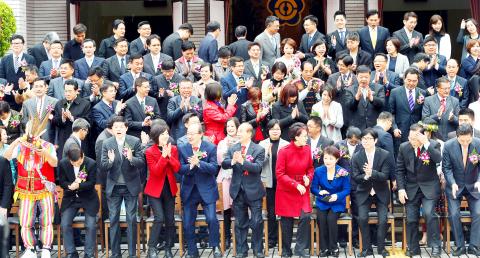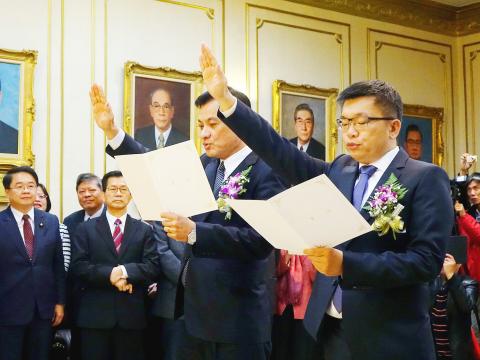Democratic Progressive Party (DPP) Legislator Su Jia-chyuan (蘇嘉全) yesterday won the ninth legislative speakership election in a widely predicted landslide victory, becoming the nation’s first non-Chinese Nationalist Party (KMT) speaker.
The voting, which began at 10:30am, was presided over by DPP caucus whip Ker Chien-ming (柯建銘), after outgoing legislative speaker Wang Jin-pyng (王金平) offered him the role.
Out of respect for Wang — the nation’s longest-serving speaker with 17 years in the post — lawmakers allowed him to cast the first ballot.

Photo: Chang Chia-ming, Taipei Times
New Power Party (NPP) Legislator Hsu Yung-ming (徐永明) said that his party would support Su and DPP Legislator Tsai Chi-chang (蔡其昌) for deputy speaker, but his motion to require legislators to sign their ballots was overruled by Ker as contrary to Legislative Yuan rules.
The rules state that writing characters other than a candidate’s name on speakership ballots invalidates a ballot.
Su won with 74 votes: 68 from DPP lawmakers, five from NPP legislators and one from independent Legislator Chao Cheng-yu (趙正宇), who joined the DPP caucus as the new legislature took office.

Photo: Chang Chia-ming, Taipei Times
Outgoing KMT caucus whip Lai Shyh-bao (賴士葆) received all 35 KMT votes.
People First Party (PFP) Legislator Lee Hung-chun (李鴻鈞) won four votes — three from PFP lawmakers and one from Non-Partisan Solidarity Union Legislator May Chin (高金素梅), who has joined the PFP caucus.
Tsai was elected deputy speaker in an afternoon vote, winning 74 votes to KMT Legislator-at-large William Tseng (曾銘宗), the former Financial Supervisory Commission chairman, who received 35 votes, while Chin won four. Tsai is the first non-KMT deputy speaker.
“Today is the day the Republic of China’s ninth legislature is sworn in. It also marks the first political party alternation in the legislature. I would like to thank everyone for their support for us. We will not forget the public’s expectations of us and we will work diligently,” Su said in his inauguration address.
Su said that he and Tsai would endeavor over the next four years to prove to voters and fellow legislators that they made the right choice.
The ninth legislature is to be a legislature of the people, one marked by openness, professionalism and the absence of “backroom deals,” Su said.
“In an effort to ensure the neutrality of the speakership and put an end to the longstanding political wrangling in the legislature, Deputy Speaker Tsai and I will immediately tender our resignations from all party posts to DPP Chairperson [and president-elect] Tsai Ing-wen (蔡英文),” Su said.
Only an open and transparent legislature can regain public trust, Su said, pledging to allow the public to decide major governmental issues through the use of online petitions and to open the legislature to citizen journalists.
Su also promised to unite lawmakers from different parties and join hands in pushing for bills conducive to public welfare and doing what is right for Taiwanese.
He ended his speech by announcing the appointment of Taiwan Solidarity Union (TSU) Secretary-General Lin Chih-chia (林志嘉), a five-term lawmaker, as the legislature’s secretary-general.
The DPP caucus met yesterday morning before the speaker election and agreed that all caucus members had to display their ballots before placing them in the ballot boxes, in an effort to prevent anyone voting across party lines.
DPP spokesperson Yang Chia-liang (楊家俍) said the policy was a manifestation of responsible politics and that the DPP caucus also planned to push for an amendment mandating that such elections be conducted in a similar manner.
Additional reporting by Abraham Gerber and CNA

Tropical Storm Gaemi strengthened into a typhoon at 2pm yesterday, and could make landfall in Yilan County tomorrow, the Central Weather Administration (CWA) said yesterday. The agency was scheduled to issue a sea warning at 11:30pm yesterday, and could issue a land warning later today. Gaemi was moving north-northwest at 4kph, carrying maximum sustained winds near its center of up to 118.8kph and gusts of 154.8kph. The circumference is forecast to reach eastern Taiwan tomorrow morning, with the center making landfall in Yilan County later that night before departing from the north coast, CWA weather forecaster Kuan Shin-ping (官欣平) said yesterday. Uncertainty remains and

SEA WARNING LIKELY: The storm, named Gaemi, could become a moderate typhoon on Wednesday or Thursday, with the Taipei City Government preparing for flooding A tropical depression east of the Philippines developed into a tropical storm named Gaemi at 2pm yesterday, and was moving toward eastern Taiwan, the Central Weather Administration (CWA) said. Gaemi could begin to affect Taiwan proper on Tuesday, lasting until Friday, and could develop into a moderate typhoon on Wednesday or Thursday, it said. A sea warning for Gaemi could be issued as early as Tuesday morning, it added. Gaemi, the third tropical storm in the Pacific Ocean this typhoon season, is projected to begin moving northwest today, and be closest to Taiwan on Wednesday or Thursday, the agency said. Today, there would likely

DISRUPTIONS: The high-speed rail is to operate as normal, while several airlines either canceled flights or announced early departures or late arrivals Schools and offices in 15 cities and counties are to be closed today due to Typhoon Gaemi, local governments announced last night. The 15 are: Taipei, New Taipei City, Taoyuan, Tainan, Keelung, Hsinchu and Kaohsiung, as well as Yilan, Hualien, Hsinchu, Miaoli, Chiayi, Pingtung, Penghu and Lienchiang counties. People should brace for torrential rainfall brought by the storm, with its center forecast to make landfall on the east coast between tonight and tomorrow morning, the Central Weather Administration (CWA) said. The agency issued a sea warning for the typhoon at 11:30pm on Monday, followed by a land warning at 11:30am yesterday. As of

CASUALTY: A 70-year-old woman was killed by a falling tree in Kaohsiung as the premier warned all government agencies to remain on high alert for the next 24 hours Schools and offices nationwide are to be closed for a second day today as Typhoon Gaemi crosses over the nation, bringing torrential rain and whipping winds. Gaemi was forecast to make landfall late last night. From Tuesday night, its outer band brought substantial rainfall and strong winds to the nation. As of 6:15pm last night, the typhoon’s center was 20km southeast of Hualien County, Central Weather Administration (CWA) data showed. It was moving at 19kph and had a radius of 250km. As of 3pm yesterday, one woman had died, while 58 people were injured, the Central Emergency Operation Center said. The 70-year-old